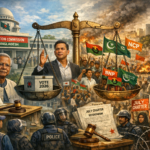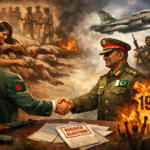The recent political upheaval in Bangladesh has set the country on a dramatic parabolic course that embodies the fervour of revolution yet poses significant questions regarding governance, efficacy, and stability. At the heart of this transformation is a newly appointed interim government, tasked with overseeing this transitional phase, but the rapid and sweeping changes introduced have sparked considerable debate. Bangladesh, a nation of over 160 million people, requires deft, experienced leadership to navigate its complex social, political, and economic issues, and some critics argue that assigning untested or unfit individuals to highly sensitive roles may jeopardize the future. This essay explores the trajectory of Bangladesh’s political shifts, the potential benefits and pitfalls of these changes, and whether the interim government has the competence to run a populous and diverse nation.
A New Chapter in Bangladesh’s Political History
Bangladesh’s political landscape has undergone transformative shifts since its independence in 1971, marked by authoritarian rule, military coups, and various political movements seeking to shape its democratic identity. In recent years, dissatisfaction with the ruling establishment’s policies, concerns over corruption, and a perceived disconnect between government actions and public welfare catalyzed a powerful demand for change. The so-called “new revolution” intends to usher in an era of transparency, people-centred governance, and equitable policies. However, this trajectory, rather than following a steady line, appears more parabolic, peaking with high expectations but, potentially, plunging with challenges and unforeseen consequences.
At the heart of the parabolic rise is the appointment of an interim government, widely regarded as a transitional solution to stabilize the nation before a structured democratic process can be restored. The interim administration’s mandate is to introduce reforms, dismantle corrupt systems, and create an environment conducive to fair elections. However, with these sweeping goals comes the complex task of governance, which requires both political acumen and bureaucratic experience.
Pitfalls of Sweeping Changes and Questionable Appointments
Despite the promising rhetoric, the rapid nature of these changes presents considerable risks. Key among these is the selection of personnel assigned to critical government positions. In any government, particularly one managing a volatile transitional phase, appointing capable, experienced individuals to leadership roles is essential to success. Assigning inept or inexperienced individuals to highly sensitive positions could result in administrative inefficiency, misallocation of resources, and failed policy initiatives, thereby exacerbating rather than alleviating existing issues.
Moreover, populist pressures often compel governments to hastily appoint figures seen as “fresh faces” or those without political backgrounds, assuming this lack of prior involvement equates to honesty and dedication. However, the complexities of running a government extend beyond sincerity; they require a deep understanding of governance, policy implications, international relations, and crisis management. Without this expertise, the interim government’s initiatives may be perceived as well-intentioned yet flawed experiments that could undermine public trust in the new leadership. The effect of such a misstep would likely be profound, as the nation could suffer from a prolonged period of political instability and uncertainty.
Can People Trust the New Interim Government?
For a populace that has witnessed various political upheavals, the efficacy of the interim government naturally becomes a topic of debate. Historically, Bangladeshis have grappled with questions of governance, transparency, and accountability. Under these circumstances, they may view the sudden appointment of untested leaders as an experiment that risks their welfare. The interim government’s ability to win public trust will largely depend on its initial actions: demonstrating accountability, avoiding nepotism, and ensuring transparency in the allocation of resources and execution of reforms.
Public scepticism may also stem from the possibility that the “new faces” of government are mere figureheads, while real power remains in the hands of the existing elite or foreign interests. If the people perceive that the changes are superficial or orchestrated by unseen hands, their trust in the interim government may wane. In a politically diverse nation like Bangladesh, unity under a single administration requires a government capable of connecting with citizens across different demographics and regions. Failure to cultivate this trust could deepen divisions, ultimately destabilizing the country further.
Is Bangladesh Too Complex for Amateur Leadership?
Bangladesh’s complexities extend beyond standard political governance. With a dense population, high poverty rates, significant rural populations, and a delicate balance between religious and secular communities, managing the country is indeed no “child’s play.” The ability to govern effectively demands not only visionary policies but also practical knowledge of crisis management, economic strategy, and international diplomacy. There are rising concerns that amateur players—no matter how well-intentioned—may lack the tools to address the nation’s multifaceted needs.
In terms of foreign policy, Bangladesh holds a strategic position in South Asia, navigating relationships with India, China, and the West, each with significant economic and political interests in the region. The risk of inexperienced leadership in this arena could destabilize these crucial relations, affecting trade, investment, and regional security. Moreover, managing the domestic economy—addressing inflation, unemployment, and infrastructure development—is a demanding task requiring seasoned experts, not novices.
Moving Forward: Challenges and Considerations
To sustain the momentum of this “new revolution,” the interim government must prioritize building a foundation of trust, transparency, and long-term planning over rapid changes and symbolic gestures. Appointing individuals who possess a strong grasp of governance, alongside mechanisms for accountability, could help alleviate public doubts and solidify the administration’s legitimacy. Without an experienced and credible team, even the best-intentioned policies may falter.
Furthermore, the interim government must communicate its objectives clearly, providing timelines, metrics for success, and open channels for public feedback. Incorporating voices from various sectors—academics, economists, sociologists, and community leaders—into decision-making processes would allow the administration to build a more resilient framework. This inclusivity, paired with a commitment to merit-based appointments, can help mitigate the risks associated with an inexperienced leadership.
Conclusion
Bangladesh’s political trajectory, following the new revolution, resembles a parabolic curve—rising with high hopes and ideals but potentially heading toward instability if left unchecked. The interim government, though symbolizing a refreshing change, must guard against the pitfalls of inexperience, rapid reforms, and populist pressure to fill positions hastily. Governance, particularly in a diverse and populous nation like Bangladesh, demands skill, resilience, and foresight—qualities that must be embedded in its leadership. Ultimately, only time will reveal whether this revolution will translate into genuine progress or become yet another fleeting phase in Bangladesh’s complex political history. As the nation watches closely, the interim government must prove that it is not a mere placeholder but a capable body committed to the long-term stability and prosperity of Bangladesh.






